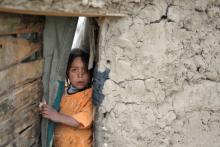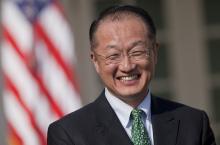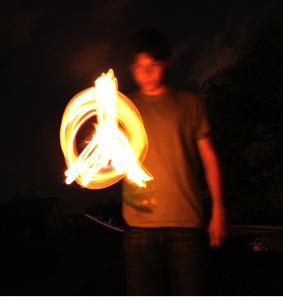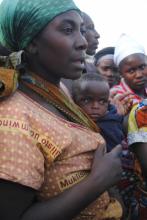United Nations
On Monday, Olivier De Schutter, U.N. special rapporteur on the right to food, submitted his report Gender and Food Security to the U.N. Human Rights Council, adding to the mountains of evidence that if you empower women with education and independent rights, they can substantially, cost-effectively, and generationally reduce hunger and malnutrition. The Guardian's Poverty Matters Blog reported:
The notion that gender equality can play an important role in reducing hunger and malnutrition has gained increasing traction in development circles. The UN's Food and Agriculture Organisation claimed in its 2010-11 State of Food and Agriculture report that equal access to agricultural resources could reduce world hunger by 12-17%. Gender and food security also came under the spotlight in the 2012 edition of the World Bank's flagship annual report, where it was argued that parity in areas including landrights, employment and political representation could improve development outcomes.
These ideas are not new. Obliged to raise children, care for sick and elderly people, and run households – work that, valued in monetary terms, would be equivalent to 15% of GDP in low-income countries, rising to 35% in middle-income countries – it has long been argued that women are being denied education opportunities, marginalising them both economically and politically. The challenge lies in convincing policymakers to do something about these multiple challenges.
Says De Schutter:
"We must address how gender roles are being defined within the family and who makes the decisions in government. ...We must refuse to take existing gender roles as givens, and instead allow women to shift the burden to men;where possible, giving women access to more opportunities and better training and education, and exposure to something other than the traditional responsibilities they have been assuming."
"If local NGOs and women's organisations and unions mobilise, using the report to put pressure on the government from below, that will be even more effective than international pressure."

Ben Emmerson, a U.N. special rapporteur, is beginning an investigation into drone strikes in Afghanistan, Pakistan, Yemen, and Somalia, according to the Guardian.
“About 20 or 30 strikes – selected as representative of different types of attacks – will be studied to assess the extent of any civilian casualties, the identity of militants targeted and the legality of strikes in countries where the UN has not formally recognised there is a conflict.
“The inquiry will report to the UN general assembly in New York this autumn. Depending on its findings, it may recommend further action. Emmerson has previously suggested some drone attacks – particularly those known as "double tap" strikes where rescuers going to the aid of a first blast have become victims of a follow-up strike – could possibly constitute a 'war crime.'"
Several nations, including Pakistan, have requested the investigation.

We call upon the United Nations to negotiate an immediate cease-fire to the war in Afghanistan, and to start talks aimed at ending the war and beginning the long road to healing and recovery.
That’s what the Afghan youth said on Tuesday afternoon in Kabul, along with Nobel Peace Prize winner Mairead Maguire of Ireland, as they launched their “Two Million Friends for Afghanistan” campaign and presented their petition to a senior United Nations official.
For me, it was the climax of a heart-breaking, astonishing eight days in one of the poorest, most violent, most war-torn, most corrupt, and most polluted places on the planet — and because of the amazing “Afghan Peace Volunteers,” the 25 Afghan youth who live and work together in a community of peace and nonviolence — one of the most hopeful.

Delegates from around the world are meeting in Doha, Qatar this month to discuss United Nations’ climate policy. In the past, these meetings were a source of hope for the environmental movement, as governments came together and committed to reducing emissions to collectively try to halt climate change.
Unfortunately, that is no longer the case.
Remember the Kyoto Protocol? Even though the reductions it mandated were nowhere near what’s required for us to reverse the trend we’ve started, we haven’t even come close to achieving those reductions. Oh yeah, and the United States didn’t even sign it.
The Protocol is expiring this year, and the U.N. Framework Commission on Climate Change (the body that created the Protocol — stick with me here) is trying in Doha to extend it for a couple years until they can reach an agreement on how to move forward.
So what’s holding the discussions back?

NEW YORK — Manhattan was a traffic nightmare as the United Nations General Assembly was in session and security precautions ramped up.
Iran's president gave his usual insulting address. Israel's prime minister volleyed with dire warnings of Iran's nuclear-weapons intentions. Not much was expected of a session that was more political podium than problem solving.
But the event did underscore a reality that Americans often overlook: Not everything is about us. The world doesn't turn on a politician's latest line of attack. The fine points of Obamacare or Mitt Romney's 1040 or Paul Ryan's budget? Meh.
On the one hand, this unconcern is nothing unusual; hometown affairs are always of far more interest to locals than to anyone else. I could go months without caring about Kate Middleton's topless cavorting or political show trials in Beijing.
On the other hand, it is good to be reminded that we are one piece of a vast global mosaic. We connect with others but aren't necessarily the center.
Rather than proceed as a nation-level version of the "narcissistic princess" — as one reviewer labeled tell-all author Monica Lewinsky — we should pay more attention to the connections among us.

Editor's Note: The following is a transcript of President Barack Obama's remarks to the UN General Assembly in New York City on Tuesday, in which he condemns global violence and extremism, framing the speech around the recent tragedy at the U.S. consulate in Libya.
THE PRESIDENT: Mr. President, Mr. Secretary General, fellow delegates, ladies and gentleman: I would like to begin today by telling you about an American named Chris Stevens.
Chris was born in a town called Grass Valley, California, the son of a lawyer and a musician. As a young man, Chris joined the Peace Corps, and taught English in Morocco. And he came to love and respect the people of North Africa and the Middle East. He would carry that commitment throughout his life. As a diplomat, he worked from Egypt to Syria, from Saudi Arabia to Libya. He was known for walking the streets of the cities where he worked -- tasting the local food, meeting as many people as he could, speaking Arabic, listening with a broad smile.
Chris went to Benghazi in the early days of the Libyan revolution, arriving on a cargo ship. As America’s representative, he helped the Libyan people as they coped with violent conflict, cared for the wounded, and crafted a vision for the future in which the rights of all Libyans would be respected. And after the revolution, he supported the birth of a new democracy, as Libyans held elections, and built new institutions, and began to move forward after decades of dictatorship.
Chris Stevens loved his work. He took pride in the country he served, and he saw dignity in the people that he met. And two weeks ago, he traveled to Benghazi to review plans to establish a new cultural center and modernize a hospital. That’s when America’s compound came under attack. Along with three of his colleagues, Chris was killed in the city that he helped to save. He was 52 years old.
Christof Heyns, U.N. special rapporteur on extrajudicial, summary or arbitrary executions, urged Washington to clarify the basis under international law of its policy:
"The (U.S.) government should clarify the procedures in place to ensure that any targeted killing complies with international humanitarian law and human rights and indicate the measures or strategies applied to prevent casualties, as well as the measures in place to provide prompt, thorough, effective and independent public investigation of alleged violations."
The Special Rapporteur again requests the Government to clarify the rules that it considers to cover targeted killings ... (and) reiterates his predecessor's recommendation that the government specify the bases for decisions to kill rather than capture 'human targets' and whether the State in which the killing takes places has given consent,"

In a move that surprised many in the world of economics and politics, on Friday morning President Obama nominated Jim Yong Kim, the South Korea-born physician, anthropologist and president of Dartmouth College, to be the next president of the World Bank.
Prior to taking the helm at Dartmouth in 2009, Kim, 52, led the global health and social medicine department at Harvard Medical School, of which he is a graduate. Widely considered one of the leading minds in world health, Kim also has served as a director of the HIV/AIDS department at the World Health Organization, where he focused on helping developing countries improve treatment and prevention programs.
Obama called Kim, “an innovative leader whose groundbreaking work to fight disease and combat poverty has saved lives around the globe.” The President said Kim is exceptionally well qualified for the position but brings “more to the role than an impressive record of designing new ways to solve entrenched problems.
“Development is his lifetime commitment, and it is his passion,” Obama said. “And in a world with so much potential to improve living standards, we have a unique opportunity to harness that passion and experience at the helm of the World Bank.”

Abuse at Afghan Prisons. How Catholic Conservatives could turn the GOP presidential race. OpEd: Jesus would not #OccupyWallStreet. OWS is "largely secular." Religious leaders see immigration as "God's Call." OpEd: Alabama new immigration law has unintended consequences. OpEd: Wall Street Worship. Could 2012 be the most ideological election in years? And much more.
Finally, as President Obama has announced, this American war will soon be over, with most of the 44,000 American troops still in Iraq coming home in time to be with their families for Christmas.
The initial feelings that rushed over me after hearing the White House announcement were of deep relief. But then they turned to deep sadness over the terrible cost of a war that was, from the beginning, wrong; intellectually, politically, strategically and, above all, morally wrong.
The War in Iraq was fundamentally a war of choice, and it was the wrong choice.
American Christian Zionism is pushing the U.S. government to support Israeli policies that our international friends find immoral and illegal.
We have come to believe that Christian Zionism underwrites theft of Palestinian land and oppresses Palestinian people, helps create the conditions for an explosion of violence, and pushes US policy in a destructive direction that violates our nation's commitment to universal human rights.
We write as evangelical Christians committed to Israel's security. We worry about your support for policies that violate biblical warnings about injustice and may lead to the destruction of Israel.
 I say a ceasefire can and also ought to mean that we will hold our peace, hold our tongues, intentionally muzzle ourselves, become mute in a discussion that can much too easily descend into verbal warfare. Often, when we are quiet in the face of verbal attack, the argument does not escalate into something that all parties involved will regret.
I say a ceasefire can and also ought to mean that we will hold our peace, hold our tongues, intentionally muzzle ourselves, become mute in a discussion that can much too easily descend into verbal warfare. Often, when we are quiet in the face of verbal attack, the argument does not escalate into something that all parties involved will regret.
I want to beat televangelist Pat Robertson to the jump on yesterday's East Coast earthquake.
Robertson is genius at knowing the mind of God when it comes to natural disasters. He blamed the Haiti earthquake on a God-offending "pact with the devil." Hurricane Katrina was God's pay-back for abortion in America.
Having spent some time with the Lord recently, I feel there is a message for President Obama: It is God's wrath that shook the White House yesterday. This was a 5.8 wake-up call.
Why is God all wrought up this time? What is it that God wants President Obama to do? Well, my friends, the issue is climate change. Global warming. Specifically, the Keystone XL "Dirty Oil" pipeline.
Bamiyan is a central Afghan town, home to two monumental Buddha statues carved out of sandstone cliffs. In a zealous attempt to purge anything considered un-Islamic, the Taliban targeted these historic statues a decade ago when they occupied and controlled Afghanistan. The defamation of non-Islamic monuments and sites caused a global response. The efforts of national leaders failed, and the Taliban destroyed the statues in March, 2001. The world community -- from Russia to Malaysia, from Germany to Sri Lanka -- expressed horror at the Buddha's demolition.
Sitting over the Bamiyan Valley since the early sixth century, one of the Buddha figures stood nearly 180 feet tall and the other 120 feet. Before their destruction, these statues were the largest Buddha carvings in the world. They were once a major tourist attraction, but the decades of conflict drove away tourists years before the Taliban blew up the statues.
